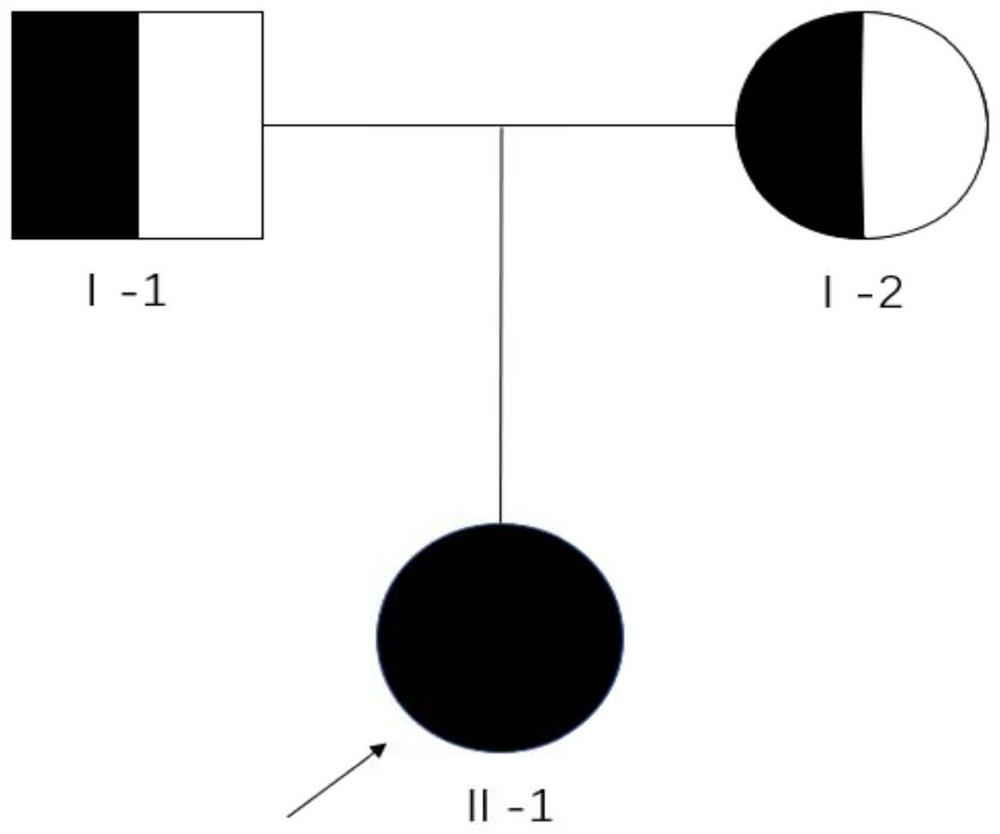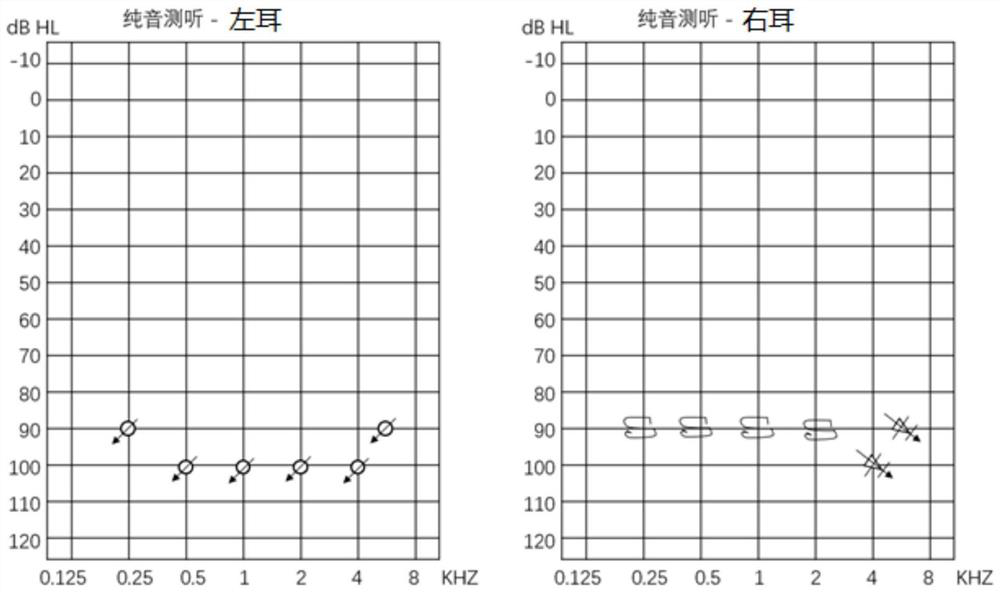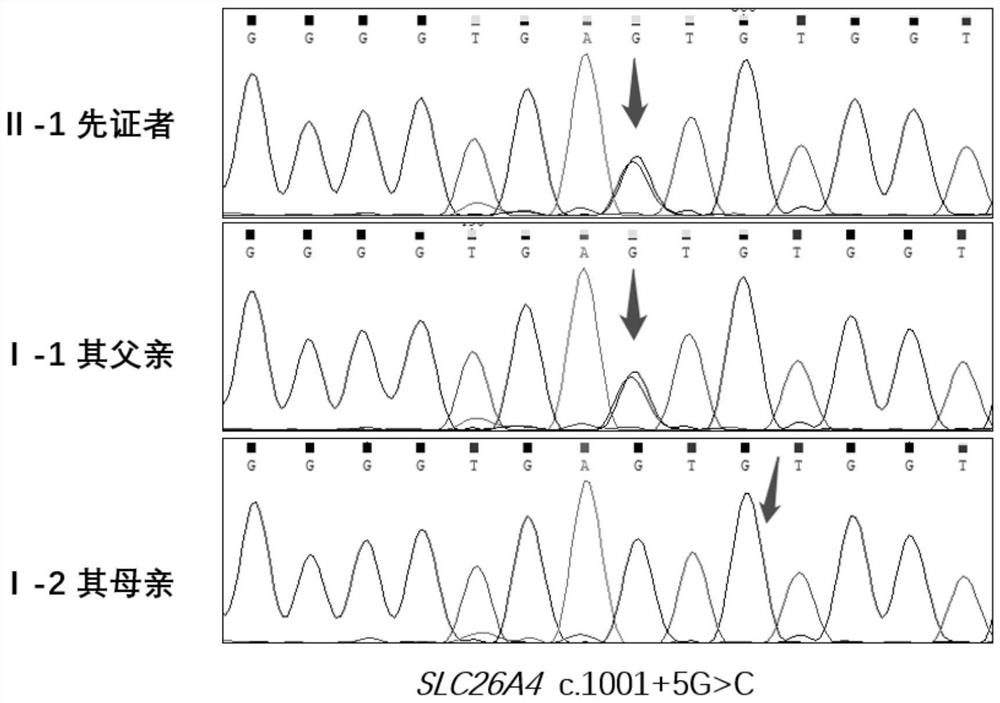SLC26A4 gene mutant and application thereof
A gene and application technology, applied in the fields of application, genetic engineering, plant genetic improvement, etc.
- Summary
- Abstract
- Description
- Claims
- Application Information
AI Technical Summary
Problems solved by technology
Method used
Image
Examples
Embodiment 1
[0083] Example 1 Determination of autosomal recessive deafness-causing mutations
[0084] 1. Sample collection
[0085] The inventor collected a Trio family (parents + proband) of Chinese Han patients with autosomal recessive non-syndromic deafness, the family diagram is shown in figure 1 .
[0086] Such as figure 1 As shown, the family contains 3 members, the daughter is a deaf patient (ie, II-1 in the pedigree chart), and the parents are normal people (ie, I-1, I-2 in the pedigree chart), conforming to autosomal recessive inheritance model. Among them, the solid icon is the patient, the semi-solid icon is the carrier, and the arrow points to the proband.
[0087] The pure tone audiometry results of the patients in this family can be seen in figure 2 shown. exist figure 2 In , the abscissa represents the frequency of the pure tone, and the ordinate represents the hearing level. If the hearing is normal, the threshold curve should be floating around 0. Such as figu...
Embodiment 2
[0096] Example 2 Sanger method sequencing verification
[0097] The SLC26A4 gene of all family members (comprising patients and parents with normal hearing) in the family of patients with autosomal recessive non-synthetic deafness provided in Example 1 is detected respectively:
[0098] Design primers for the c.1001+5G>C and c.128delG mutations of the SLC26A4 gene, then obtain the relevant sequence of the mutation site through PCR amplification, product purification and sequencing, and determine whether it is a mutant or wild type to verify the SLC26A4 gene Whether the c.1001+5G>C and c.128delG mutations are detected in the sample.
[0099] Specific steps are as follows:
[0100] 1. DNA extraction
[0101] According to the DNA extraction method described in Example 1, the genomic DNA in the peripheral venous blood of the subject was extracted for future use.
[0102] 2. Primer design and PCR reaction
[0103] First, referring to the human genome reference sequence GRCh37 / hg1...
Embodiment 3
[0121] Embodiment 3 detection kit
[0122] Prepare a detection kit, which includes primers capable of detecting the c.1001+5G>C and c.128delG mutations of the SLC26A4 gene, for screening biological samples susceptible to autosomal recessive non-synthetic deafness, wherein these primers are The sequences of the SLC26A4 gene-specific primers are shown in SEQ ID NO: 3-4 and SEQ ID NO: 5-6 in Example 2.
[0123] The specific steps for screening biological samples susceptible to autosomal recessive non-synthetic deafness using the above kit are as follows:
[0124] According to the method described in step 2 of Example 1, the DNA of the test subject is extracted, and the DNA of the extracted DNA is used as a template to carry out a PCR reaction with the specific primers of the above-mentioned SLC26A4 gene (see Example 2 for the PCR reaction system and reaction conditions), and according to Conventional methods in the art purify the PCR product, sequence the purified product, and t...
PUM
 Login to View More
Login to View More Abstract
Description
Claims
Application Information
 Login to View More
Login to View More - R&D
- Intellectual Property
- Life Sciences
- Materials
- Tech Scout
- Unparalleled Data Quality
- Higher Quality Content
- 60% Fewer Hallucinations
Browse by: Latest US Patents, China's latest patents, Technical Efficacy Thesaurus, Application Domain, Technology Topic, Popular Technical Reports.
© 2025 PatSnap. All rights reserved.Legal|Privacy policy|Modern Slavery Act Transparency Statement|Sitemap|About US| Contact US: help@patsnap.com



